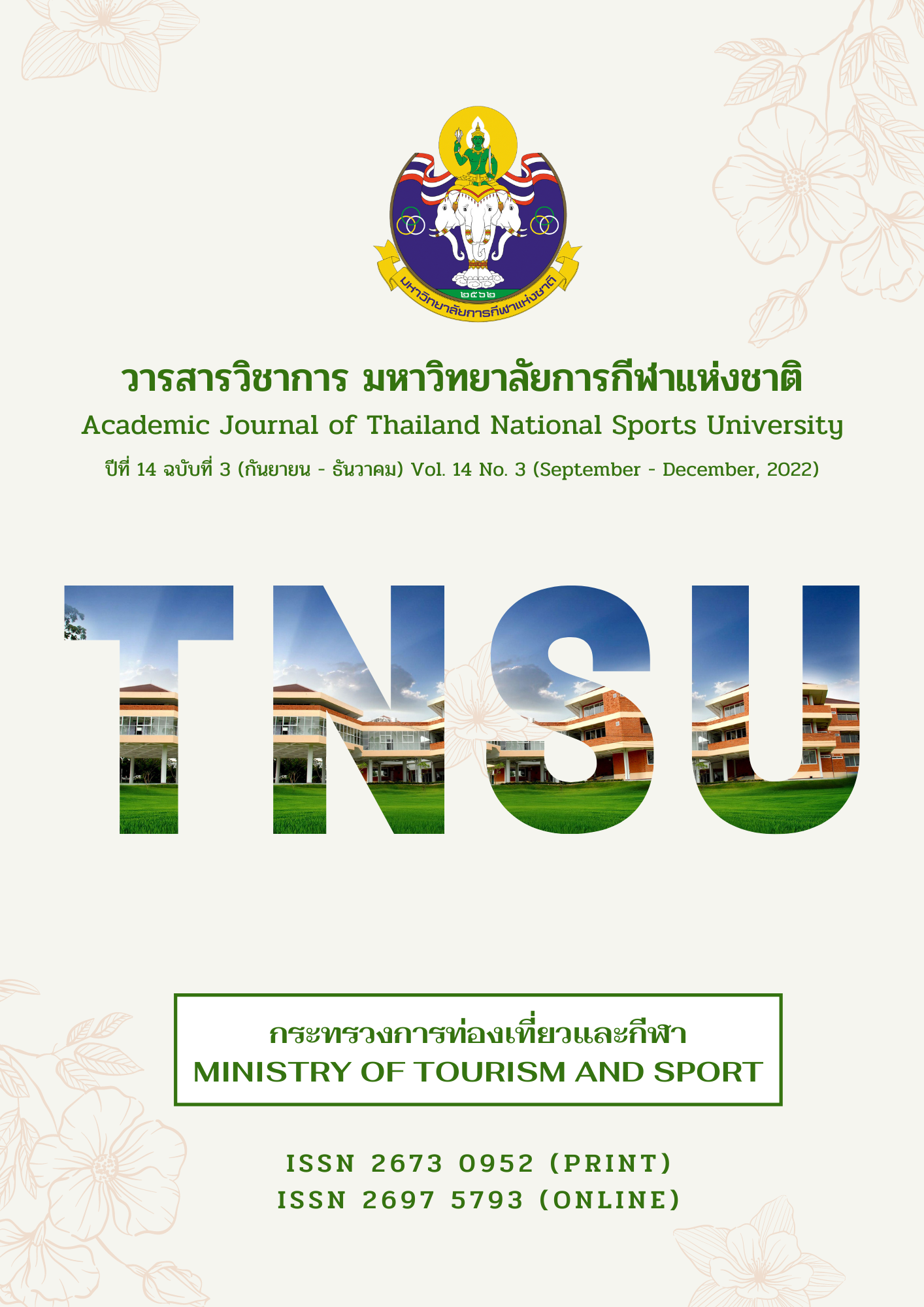PHYSICAL EDUCATION ADDITIONAL COURSE CURRICULUM USING GOAL SETTING THEORY TO ENHANCE CONCENTRATION OF PRIMARY SCHOOL STUDENTS
Main Article Content
Abstract
This research was a mixed method using quantitative and qualitative research. The objectives of this research were to: - 1) study the current situations and needs of a physical education additional course curriculum using goal setting theory to enhance concentration of primary school students; 2) develop a purpose Physical Education Additional Course Curriculum. The samples were Physical Education Teachers, divided into an interview group of 6 experts and another QA group of 378 PE teachers, using multi-stage sampling and randoming using Taro Yamane from primary schools under Office of the Basic Education Commission. The instruments were a guideline question for semi-structured interviews and a survey questionnaire. The total Index of consistency (IOC) were 0.97 with reliability of 0.96. The data were analyzed using Mean score, S.D, and PNI modified index. Research results were found that the course curriculum composed of 4 compositions: - 1) objectives should focus on the concentration, moral, physical fitness, knowledge, skills and attitude; 2) contents should include adapted Thai sports games with concentration focused, meaningful learning from games group, beside the core content of national curriculum; 3) learning activities should focus on basic movement, rhythmic movements; 4) assessment should be well planning using tests specification, validated analyze the quality of the tests and back up the evaluation data.
Article Details

This work is licensed under a Creative Commons Attribution-NonCommercial-NoDerivatives 4.0 International License.
The published article is a copyright of the Academic Journal of Thailand National Sports University. The passage appeared in each article in this academic journal is a perspective of each author which is not related to the journal. Each author is required to be responsible for all components of his/her own article. If there are any mistakes, each author must be responsible for those mistakes on his/her own.
References
Department of Mental Health. (2018). Invite Thai people to celebrate "Wisakha Bucha Day" meditation helps bright brain, not distracted, good memory. Retrieved from https://www.dmh.go.th/news-dmh/view.asp?id=27964
Goerg, S. (2016). The effects of purposeful physical activity on student concentration in a Montessori Children’s House (Master’s thesis), St. Catherine University.
Kanokwan Tongtumrung. (2018). Conservation and development of folk wisdom for Children of Northern Thailand. Veridian E-Journal Silapakorn University, 11(1), 1320 - 1336.
Keaw Promkeaw. (2016). Reality group counseling for enhance goal setting in life of drug addicts. Journal of The Police Nurses, 8(1), 11 - 22.
Nopphu Punpho. (2019). Effects of self - directing programs on successful work in the classroom of students who have hyperactivity grade 2. Executive Journal, 13(30), 267 - 278.
Pang Chinnapong. (2020). Teach your child to be a high LOC persom. Retrieved from https://mgronline.com/qol/detail/9630000073885
Sarin Phadu. (2019). States and problems on the measurement and evaluation of physical education at demonstration schools under the Office of the High Education Commission. Journal of Graduate Studies Valaya Alongkorn Rajabhat University, 14(1), 257 - 268.
Sasson, R. (2020). Tips to Help Increase Your Child's Concentration. Retrieved from https://www.successconsciousness.com/blog/concentrationmindpower/increase-child-concentration/
Sitthipong Pannark. (2020). Application of games in the management of learning in physical education. Journal of Education Studies Chulalongkorn University, 47(1), 474 - 486.


